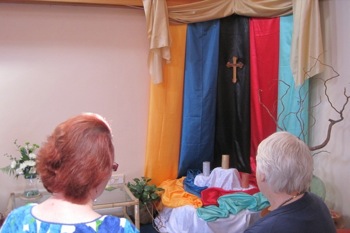| Minister's Letter - October 2019 | |
|---|---|
| Dear friends, On 8th September, my sermon was about worship at Chandler’s Ford Methodist Church. A number of people found it helpful and our Leadership team have asked me to include some of it in a slightly longer than usual Link letter. The two appointments I have had as a Methodist minister have been in situations where there was diversity and difference. Over the past year, I’ve wondered whether or not Chandler’s Ford Methodist Church is diverse, and I’ve now recognised that it is reflected in our different worship preferences. I hear some among us are thinking of leaving, because they don’t like Church with Choices, or the music we have on the first Sunday of the month. I gather others think we’re not moving fast enough to include contemporary music in services. I’ve also heard that some people don’t like the bread and wine we use for communion, yet I also know that for some among us, gluten, egg, dairy and some chemicals, are literally life-threatening. These things matter, but creating united communities out of diverse or divided ones isn’t easy, because we human beings find it hard to let go of what we think matters most. But it’s not hopeless, and it’s not hopeless because the road on which Jesus invites us to travel to Jerusalem is also the road that leads to the resurrection, and to new life. The reading set for 8th September was Jesus on the road to Jerusalem again. (Luke 14: 25–43) What he says sounds shocking. However, he isn’t suggesting we literally “hate” our families, he’s inviting us to place commitment to him above other loyalties. This is reinforced by the words about carrying the cross. For Jesus, discipleship is defined by “carrying the cross,” which means giving up self-interest, and being loyal to him. He knows it isn’t easy to do either, but faith is never easy, or low-cost. So, those who want to travel with him to Jerusalem, need to consider whether or not they can do as he asks. He offers two parables to reinforce the point about the cost of discipleship, and Debie Thomas, who writes a weekly lectionary essay, says this about it. Discipleship is “a full soul, full body, full mind endeavour that requires renunciation. And surrender. And a re-ordering of our identities, our priorities and our desires. It requires ‘hating’ what is too narrow, too exclusive, and too insular, and learning instead to love what is broad, inclusive, and boundless.” I found her thoughts on the reading helpful, so I used them to shape my sermon. She began with a story and then asked some questions. This is the story. “A large, multi-cabined ship sets sail across the ocean. A passenger whose cabin is on the lowest level of the ship decides to dig a hole in the floor of his cabin. Sure enough, the ship begins to sink. When the other passengers realize what’s happening, they rush to the man’s cabin. ‘What are you doing?!’ they yell. The man looks up from the hole and says, ‘It’s my cabin. I paid for it.’ And down goes the ship.” These are the questions. What do I consider “mine”? Who is my “we”? What am I willing to “hate”? What do I consider mine? What is “mine” isn’t only about the things we own, and it goes further than homes, possessions, and money. It’s also our views of ourselves, how we should use our time, and live our lives. It also has implications for our relationships with people, our jobs, our independence and health, and our religious and political beliefs. How possessive about these things are we? Do we cling to them? How dependent are we on them for our identity? Jesus’s call to discipleship is a call to non-possessiveness. He invites us to un-attach ourselves from them. Not, not to have them, but not to place what is “mine” first. For that place is for God. So, what does this mean in relation to worship at Chandler’s Ford? What I see is an invitation to notice how attached we are to a particular way of worshipping. Do you think you can only worship God in the way you prefer? Whether that’s with contemporary music and the band or hymns and an organ. Whether you prefer a short short-piece and lots of interactive activities or a longer sermon. Whether it’s with silence or lots of words. If you can only worship God in particular ways, your challenge today is to consider why you are so attached to it and are not open to other ways of worshipping God. Following Jesus isn’t primarily about our worship preferences – ‘though we have them. The point is what we do with them. If we insist that “my way,” is the only way, then we have some work to do. For “mine” and “my” will ultimately sink the ship. The next question Debie Thomas asks, is, “who is my ‘we’?” She wonders, “How narrow or how wide is the circle that encompasses ‘my people,’ the people I will love, welcome, serve, and make sacrifices for? Can I embrace a ‘we’ that is broader and riskier than any I’ve embraced so far? A ‘we’ that transcends race, ethnicity, religion, sexuality, and all other socially constructed categories? How aware am I, on a daily basis, that the ship – the whole ship, not just my corner of it – has an irrefutable claim on my life?” Our Services need to help us worship God in ways that suit our spirituality. They need to feed us and help us to grow. They need to help us respond to God’s love and resource us for our lives in the world. They need to be able to do that for all of us – and be open to being changed by those who haven’t yet joined us. That is challenging. We’re starting a conversation about these things, but it’ll only be useful, if together, we can think about worship across the whole church; not just the part that’s “mine” or that I prefer. Whether that’s in one of our five Services, on Sunday with children and young people, in house groups, or the fellowships: if you can only think of “we” in relation to the things you do, or worship as your Sunday Service, your challenge is to consider whether you can be open to a bigger “we.” “We” is the whole body of Christ. I’m not suggesting we shouldn’t have friends or the groups that make us feel we belong. The point is what we do with them. If we insist that everyone else in the church must be like us, or express their belonging in the same way we do, then we have some work to do. For “we” will ultimately sink the ship. The third of Debie Thomas’ questions is what I am willing to “hate”? The question this is asking is what ties must I loosen? We’re invited to loosen, to abandon, to subordinate everything that gets in the way of God, God’s mission and God’s kingdom. The church is the only human institution that exists, not for its own members, but for those who are not yet members. Its task is to draw other people into the body of Christ, into the life of discipleship, so that God’s kingdom might come on earth as it is in heaven. We need to let go of anything that gets in the way of that happening, because our future depends on it. Not only the church’s future, but the whole of creation too, and this needs to be the context for our thinking about worship at Chandler’s Ford. It isn’t just for us, not even for the most inclusive “we.” It’s also for those who don’t belong to us, and might never do, but who look at us and wonder about what sort of God we worship. They’ll see this in our behaviour, our priorities, what we say and through what we do. They’ll know whether or not it has integrity. Their understanding of the Gospel will be influenced by it. So, if you cannot bring yourself to let go of your insistence on having your way or your narrow understanding of who “we” are, your challenge is to wonder why you cannot place God first. Of course, we are all still growing, and it takes a lifetime of discipleship to place God first in everything. But if you’re not learning to loosen, to let things go, then please try to begin to learn before we sink the ship. This is all challenging, especially because at the same time, we must also care about the survival of the church, about numbers, attracting newcomers and affording it all. All the world insists “It’s my cabin, I paid for it”. If you are waiting for me to tell you the way forward for our worship, I can’t. It isn’t what we do, but how we do it, that matters most. If we’re open to letting go of “my” demands. If we can widen who “we” are. If we can “hate” what gets in the way of God’s kingdom, we’ll also experience resurrection and new life. Jesus didn’t say following him would be easy and it isn’t something we do ourselves. It’s possible because of God’s love, grace and generosity, and it becomes ours as we cooperate with God, and grow ever more fully into the likeness of Christ. I finished with another story from the Jewish tradition, but I’ve already taken up too much space, so I’ll tell you it in another Link. In the meantime, I invite you to pray with what you have read, and for the future of this Church. With good wishes, Sue. | |



